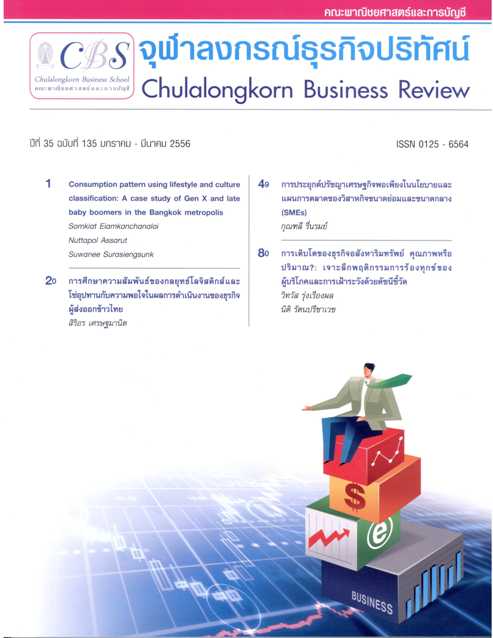การประยุกต์ปรัชญาเศรษฐกิจพอเพียงในนโยบายและแผนการตลาด ของวิสาหกิจขนาดย่อมและขนาดกลาง (SMEs)
Main Article Content
Abstract
งานวิจัยเรื่องนี้มีวัตถุประสงค์ที่ต้องการทราบว่าผู้ประกอบการ SMEs รับรู้เรื่องปรัชญาเศรษฐกิจพอเพียงเพียงใด และ SMEs ได้มีการนำปรัชญานี้ไปประยุกต์ในการกำหนดนโยบายและแผนการตลาดขององค์กรเพียงใดและในด้านใดบ้าง รวมทั้งต้องการทราบว่าปรัชญาเศรษฐกิจพอเพียงที่ประกอบด้วยปัจจัย 5 ประการ ได้แก่ ความพอประมาณ เหตุผล ภูมิคุ้มกัน ความรู้ และคุณธรรม มีความกลมกลืนกับข้อมูลการดำเนินงานของ SMEs หรือไม่ การออกแบบงานวิจัยเป็นทั้งงานวิจัยเชิงปริมาณและงานวิจัยเชิงคุณภาพ โดยการสัมภาษณ์เจาะลึกผู้ประกอบการธุรกิจ SMEs จำนวน 15 ราย และนำข้อมูลที่ได้มาเป็นแนวทางในการพัฒนาแบบสอบถามเพื่อใช้ในการสำรวจกลุ่มตัวอย่างผู้ประกอบการ SMEs ในเขตกรุงเทพมหานคร โดยส่งแบบสอบถามไปยังผู้ประกอบการ SMEs ทั้งสิ้น 1,520 ราย แบบสอบถามที่ได้รับกลับคืนที่มีความสมบูรณ์มีจำนวน 325 ราย คิดเป็นร้อยละ 21.38 ของจำนวนแบบสอบถามที่ส่งออกไปทั้งหมด
ผลการวิเคราะห์ข้อมูลและการทดสอบสมมติฐานพบว่าผู้ประกอบการ SMEs ส่วนใหญ่มีความเชื่อและทราบความหมายของปรัชญาเศรษฐกิจพอเพียง และได้มีการนำปรัชญานี้ไปประยุกต์ในนโยบายและแผนการตลาดของ SMEs ทั้งอย่างเป็นทางการและไม่เป็นทางการในหลากหลายด้านของการดำเนินธุรกิจและสามารถบรรลุผลในภาพรวม ผู้ประกอบการจะประยุกต์ปรัชญานี้ในการทำธุรกิจต่อไปในอนาคต นอกจากนี้ ผลการวิเคราะห์ปัจจัยเชิงยืนยันพบว่าปรัชญาเศรษฐกิจพอเพียงมีความกลมกลืนกับการดำเนินธุรกิจของ SMEs จากข้อมูลที่เก็บรวบรวมได้
งานวิจัยเรื่องนี้ทำให้ได้ทราบถึงข้อมูลที่มีประโยชน์ในการประยุกต์ปรัชญาเศรษฐกิจพอเพียงของธุรกิจSMEs ผู้วิจัยได้อภิปรายผลการวิจัย และให้ข้อเสนอแนะสำหรับ SMEs โดยเฉพาะการสร้างระบบภูมิคุ้มกันเพื่อให้ธุรกิจสามารถดำรงอยู่ได้อย่างมั่นคงและยั่งยืน ข้อเสนอแนะแก่หน่วยงานภาครัฐที่เกี่ยวข้อง รวมทั้ง ข้อเสนอแนะสำหรับงานวิจัยในอนาคต
คำสำคัญ: ปรัชญาเศรษฐกิจพอเพียง วิสาหกิจขนาดย่อมและขนาดกลาง
Abstract
This research aimed to study the perception of the SMEs’ owners toward the Philosophy of Sufficiency Economy and whether this Philosophy had been applied to their business policies and marketing plans, the level of applying and in which aspects. In addition, to discover whether the Philosophy of Sufficiency Economy which is composed of five factors: moderation, reasonableness, immunity, knowledge and morality fit to the gathered data. The research design was both quantitative and qualitative research by in-depth interviewing 15 SMEs entrepreneurs and used the results to develop the questionnaire for surveying the samples who were the SMEs entrepreneurs in Bangkok. Questionnaires were sent to 1,520 SMEs entrepreneurs. The complete returned questionnaires were 325 which was accounted to 21.38% of all sent questionnaires.
The results of the data analysis and hypotheses testing found that the majority of SMEs entrepreneurs believed and knew the meaning of the Philosophy of Sufficiency Economy. This philosophy was formally and informally applied into the policies and marketing plans of SMEs in many dimensions of the business operations and the overall results can be achieved. The entrepreneurs would continue to apply the philosophy in their businesses in the future. Furthermore, the results of the confirmatory factor analysis found that the Philosophy of Sufficiency Economy fitted to the operations of SMEs from the gathered data.
The research results provided the useful data in applying the Philosophy of Sufficiency Economy for SMEs. The researcher discussed the research findings and gave the recommendations for SMEs especially the creation of the immunity system for their businesses to be stable and sustainable. The recommendations were given for the involved governmental agencies as well as the recommendations for future research.
Keywords: The Philosophy of Sufficiency Economy, SMEs
Article Details
Opinions and discussions in papers published by the Creative Business and Sustainability Journal (CBSJ) are deemed as personal opinions and the responsibility of the writers. They are not the opinions or responsibility of the Chulalongkorn Business School of Chulalongkorn University.
Papers, content, information etc. appearing in the Journal are deemed to be the copyright property of the Chulalongkorn Business School of Chulalongkorn University. Anybody or any organization that wishes to publish any part of them or use them in any way must obtain written permission from the Chulalongkorn Business School, Chulalongkorn University.


